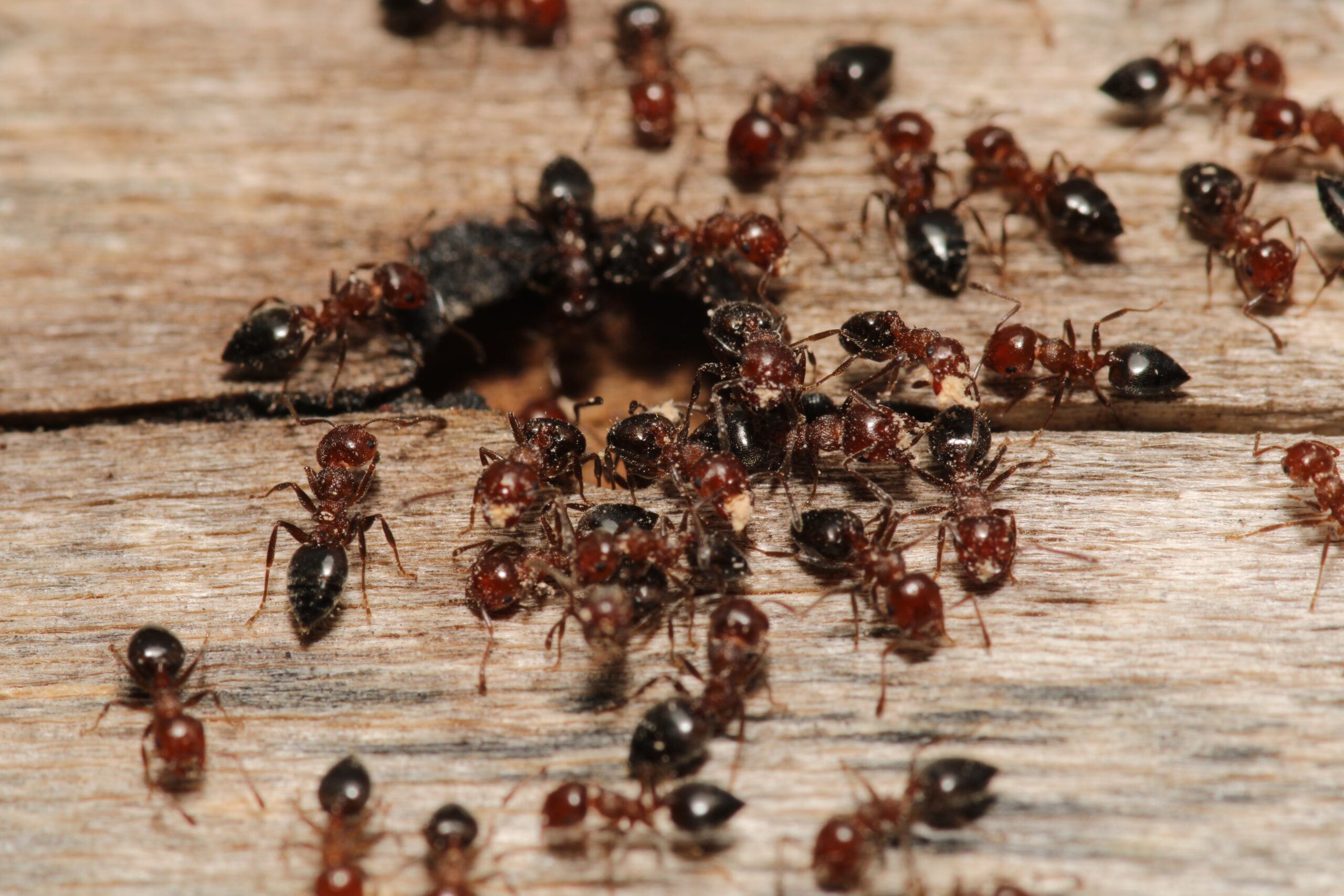Summary: Every pest is a nuisance, but there are some pests that are a real pain to eliminate. This blog gives all the details on the 5 pests that are the most time-consuming and tough to eliminate, according to Romney Pest Control. The hardest pests to eliminate are: termites, cockroaches, rodents, carpenter ants, and bed bugs. Each pest’s section includes a quick description and 4 reasons why that pest is difficult to treat and kill. Romney Pest Control is devoted to solving each pest problem with complete care and efficiency.
Let’s be honest: no pest is a fun time to be around. We’re not hoping that an army of ants or a family of spiders invades our homes tonight (in fact, we wish for the exact opposite). But there are some pests that seem impossible to get rid of once they’re inside the house. Whether it’s because of a pesticide resistance or a rapid rate of reproduction, certain pests are bound and determined to stay right where they are. Let’s dive into the main reasons why these pests are the most difficult ones to eliminate — at least, in our experience.
Termites
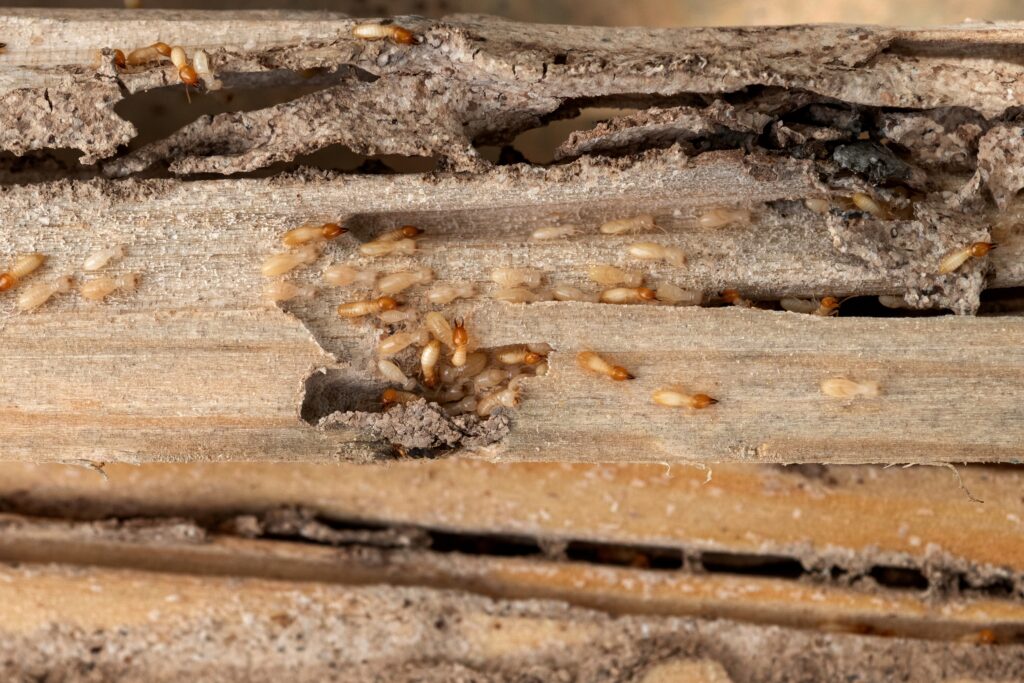
If you search the titular question online, you may notice a couple of things. One is this blog as a result (welcome!), and the other is the abundance of termite mentions. This pest is often seen as the most difficult critter to eliminate from any house or building. The other pests on our list give termites a run for their nonexistent money, but we completely understand the reasoning behind giving termites the top spot.
Our primary reasons why termites are so difficult to get rid of are:
- Termite queens live a long time. Termites are eusocial, so they live in colonies produced by one queen (with younger ones on standby in case of emergency). The queens live for about 25 years and can produce up to 30,000 eggs a day.
- Termites are experts at hiding. Since they’re always active, termites are tough to spot until their colony is so large that their nest can’t hold them all. They chew deep into their wooden habitat to avoid the light and any enemies, so it’s hard to find them until it’s too late.
- Termites ruin structures by eating through them. Termites prefer damaged natural wood because it’s easy to gnaw through, so any part of a house that’s already damaged is at risk of being further damaged by termites. The foundation, walls, and framework are the common targets.
- Termite colonies need to be completely eliminated. Termites are like ants and wasps in that you need to eliminate the entire colony to actually solve the problem. If any termite swarmers survive, they will start producing more eggs to keep the colony populated.
Cockroaches

As a common symbol of disgust and unkempt spaces, roaches fulfill their unsightly reputation by being tough to eliminate. They survive the most dire of conditions, avoid common pest treatments, and reproduce quicker than other pests. It doesn’t help that they’re nocturnal and avoid the light at all costs, making it easy to miss an invasion until it’s grown into a major problem.
Our primary reasons why cockroaches are so difficult to get rid of are:
- Roaches reproduce quickly. Every species is different, but on average, female cockroaches produce 300 to 400 eggs in their lifetimes. They either put the egg cases (oothecae) in a protected place or carry the eggs around until they hatch and disperse.
- Roaches are also great hiders. Like most of the pests on this list, roaches prefer to be hidden from sight. They hide in dark, moist areas that give them easy access to food sources. These pests are the garbage disposals of the pest world: they’ll eat anything!
- Roaches compress their bodies. Speaking of being good at hiding, roaches fit into the tightest of spaces by compressing to 60% of their original height. They intentionally flatten themselves to hide in between objects and to stay safe from predators and pesticides.
- Roaches are resistant to pesticides. Well, for the most part. Cockroaches are immune to many of the traditional treatments that work on other pests. This is why professional pest control is needed to eliminate them, as the technicians use specialized roach baits and traps.
Rodents
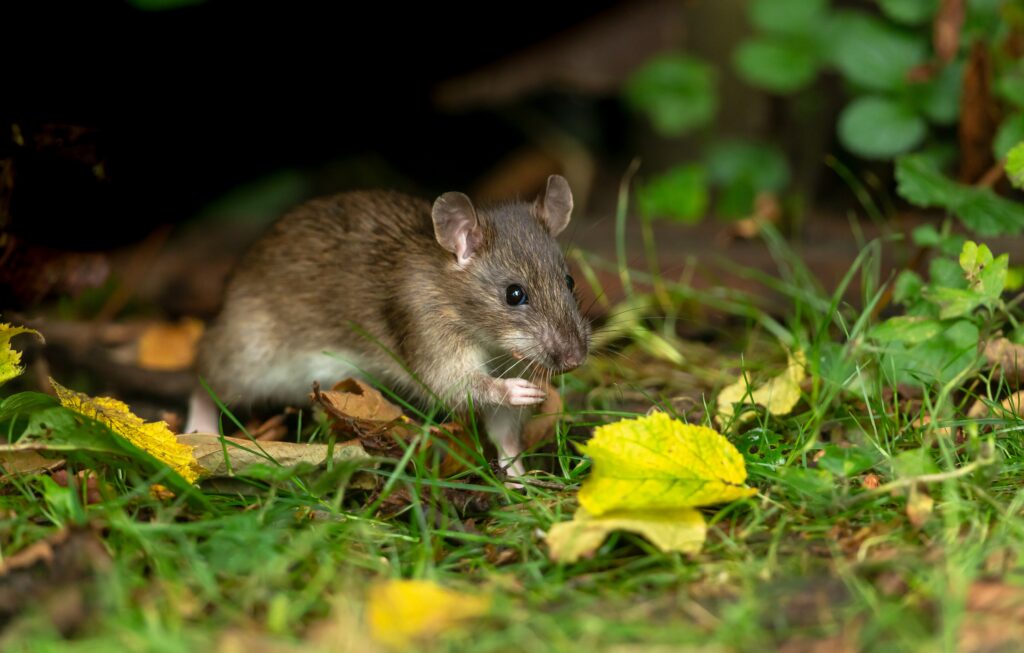
Rats and mice are sometimes kept as pets, but the wild critters that force their way into our homes aren’t very cute and cuddly. These rodents are often riddled with diseases that they spread to humans and animals in a number of ways. Between their strong teeth and their ever-growing families, rodents aren’t friends of ours in most circumstances.
Our primary reasons why rats and mice are so difficult to get rid of are:
- Rodents can chew through anything. Their teeth are strong and open-rooted, which means rodents need to constantly use their teeth to keep them at a manageable length. Rodents easily chew through most household materials, such as plastic, insulation, wood, fabric, plastic, and drywall.
- Rodents are active year-round. As long as they have a warm shelter and plenty of food, rodents will continue their normal activities all year long. Rats and mice are some of the most common winter pests because they invade warm homes and cause problems throughout the colder months.
- Rodents contaminate everything. Basically, rodents are filthy creatures that cause major health risks just by existing. They spread diseases both directly (bites and droppings) and indirectly (walking on surfaces). Rat-bite fever, hantavirus, and plague are commonly transmitted by rodents.
- Rodents reproduce quite often. The rate depends on the species, but rats and mice both produce multiple litters a year. An infestation will grow out of control before you know it. Rats produce up to 6 litters per year, while mice produce up to 10 litters a year.
Carpenter Ants
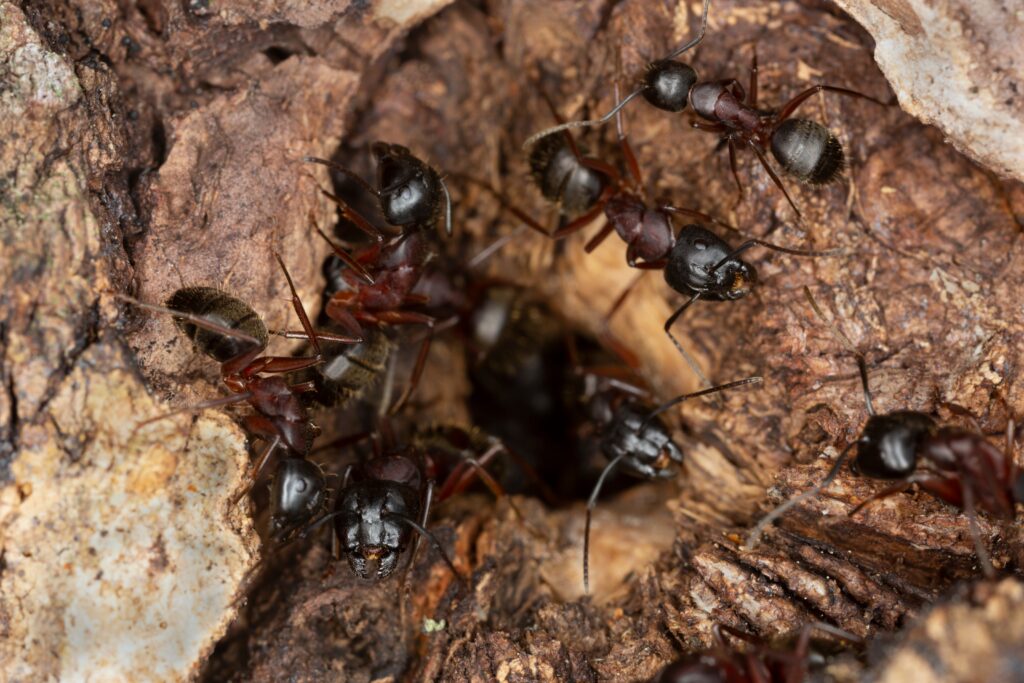
Similar to termites, carpenter ants live in huge colonies inside the galleries that they carve into natural wood. The main difference between termites and carpenter ants is that carpenter ants don’t eat the wood they chew through, but termites live off of wood as their only food source. Carpenter ants still try to steal our food at every turn, so they’re basically a worse version of an already-frustrating pest.
Our primary reasons why carpenter ants are so difficult to get rid of are:
- Carpenter ants hide inside wood. Like any wood-boring pest, carpenter ants try to stay hidden in their tunnels and galleries as much as possible. The only times you usually see carpenter ants are either when they’re foraging for food or the colony is too big to fit in their original habitat.
- Carpenter ants come from huge colonies. Carpenter ant queens are the same as regular ant queens, as they both produce thousands of eggs in their lifetimes. The queen is guarded at all times by designated workers and stays in the innermost part of the nest. As long as the queen and her successors are alive, the colony will grow.
- Carpenter ants exploit house damage. Any wood that’s damaged by moisture or age is appealing to carpenter ants. Their strong, sharp mandibles (mouth parts) easily cut through the soft wood and further damage the wood, rendering it weak and a safety risk.
- Carpenter ants invade our food. Since they don’t eat wood, carpenter ants also have scavengers that gather enough food to sustain the colony. They prefer foods that are full of protein and sugar because these qualities give the ants enough energy to continue working.
Bed Bugs
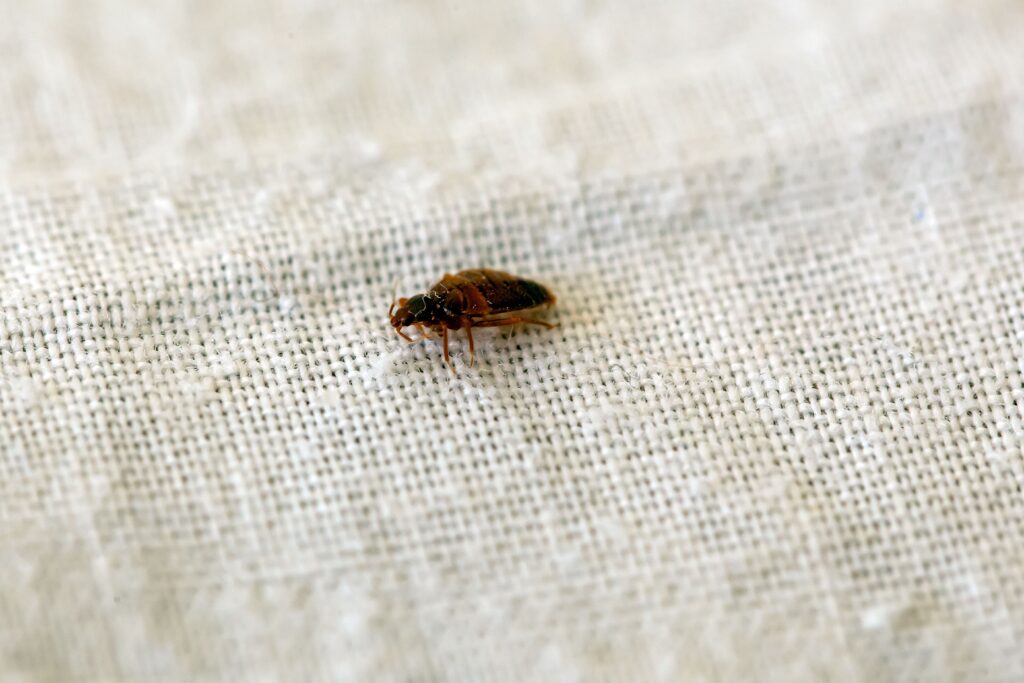
This list would not be complete without the mention of our old bloodsucking friends: bed bugs! Contrary to popular belief, bed bugs don’t solely live in “dirty” motels. As long as they have a steady food source, bed bugs will live in any environment that provides them with a dark shelter. The key to preventing bed bugs — or any of these pests — is to stay vigilant.
Our primary reasons why bed bugs are so difficult to get rid of are:
- Bed bugs are resistant to pesticides. Bed bugs always need to be treated by a professional because they aren’t affected by most standard pesticides. The most efficient way to kill bed bugs is heat treatments (over 100°!), but these still take time to work against a full infestation.
- Bed bugs don’t need to eat every day. If they could, they would. Bed bugs don’t like to go more than a day without a blood meal, but they can technically survive up to a year without food. As soon as they have an opportunity to feed on a mammal, they will take it to avoid going too long without sustenance.
- Bed bugs are expert hiders. Similar to roaches, bed bugs can flatten their bodies to squeeze into the tightest of spaces when they don’t want to be found. Bed bugs prefer to hide in tight and dark spaces, like under mattress seams and inside suitcases.
- Bed bugs reproduce with each meal. Female bed bugs can produce anywhere from 5 to 20 eggs with each blood meal. They often lay more than 200 eggs in their lifetimes! The longer that a bed bug infestation is left alone, the larger their group will become.
The Hardest Pest Problems Are No Match For Romney!
Whether you’re battling one of the pests in this blog or you’re facing an entirely different issue, Romney Pest Control is here to help! Our technicians are fully licensed and experienced in solving all kinds of Texas-sized pest problems. We begin every service with a thorough inspection, where we search for all signs of pest activity on the property. These observations help us create a treatment plan that’s customized to solve your pest concerns. Our efficient treatments are tough on pests but easy on you and your family. Contact us today for more information on our pest control services that always get the job done!
Citations
Harney, C. (2023, June 5). The four most difficult pests to control. Pointe Pest Control. Available at https://www.pointepestcontrol.net/the-four-most-difficult-pests-to-control/ (Accessed on July 1, 2024).
McCarthy, N. (2020, May 31). Which bugs are hardest to get rid of — and why?. Steri-Fab. Available at https://www.sterifab.com/post/hardest-to-kill-bugs (Accessed on July 1, 2024).
Jonaitis, J. (2022, January 20). 7 pests most likely to invade your home, and how to get rid of them. Angi. Available at https://www.angi.com/articles/5-pests-most-likely-invade-your-home-and-how-get-rid-them.htm (Accessed on July 1, 2024).
List: Top 5 pests we love to hate. (n.d.). Pest World. Retrieved July 1, 2024, from https://www.pestworld.org/news-hub/pest-articles/list-top-5-pests-we-love-to-hate/
Williams, G. (2024, February 22). The 5 worst bugs for your home. US News: Real Estate. Available at https://realestate.usnews.com/real-estate/articles/worst-bugs-for-your-home (Accessed on July 1, 2024).

